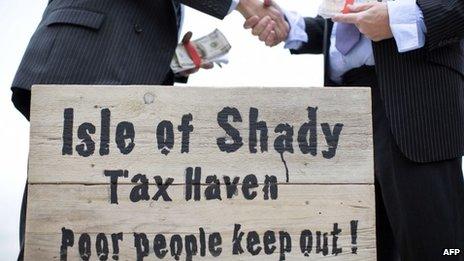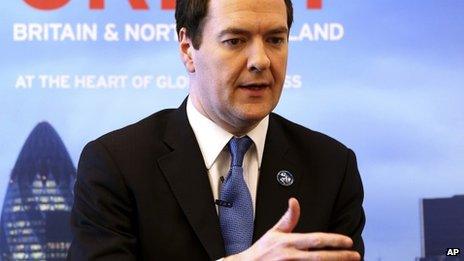HMRC targets tax evaders with offshore accounts
- Published

Campaigners say rich countries should do more to tackle tax evasion
The government has launched an advertising campaign targeting people who have been evading taxes by holding money in offshore accounts.
Chancellor George Osborne said the campaign aimed to make it "very clear" that if people hid money offshore "then we are coming after them".
Tax evaders could face fines of 200% of the tax owed and the possibility of criminal prosecution and imprisonment.
"Ultimately, this is about fairness," Mr Osborne told Australia's ABC TV.
"People have to pay their taxes."
Net 'closing'
Mr Osborne said tax evasion "means that others have to pay higher taxes and, as a society, we all have to make a contribution".
He said the authorities were "expecting to collect a significant amount of revenue but the challenge is finding out exactly what is hidden offshore".
HM Revenue & Customs (HMRC) director general for enforcement and compliance, Jennie Granger, said most people with offshore assets "do the right thing and tell us about them" but "for the minority who do not, the net is closing around them".

George Osborne: "It is not fair" if big companies shift profits around artificially
She said those with undeclared offshore assets should contact HMRC urgently or face penalties.
"The days of hiding money in another country to cheat the UK are coming to an end," she said.
The government has repeatedly said it will hunt down tax evaders but Labour has questioned how effective its efforts have been, with one high-profile campaign failing to catch many of its targets.
Some campaigners have argued the efforts of government and the tax authorities would be better directed at tackling legal but aggressive tax avoidance, especially by big companies.
'Outrageous'
Mr Osborne was speaking after a meeting of G20 finance ministers in Sydney, Australia.
He said the gathering had achieved "a real breakthrough" on tax, with countries agreeing to exchange information so individuals could not hide money offshore.
He said the finance ministers had also "come together to say it is not fair if big companies avoid their taxes by shifting their profits around artificially to different countries".
His comments restated a G20 commitment in 2012 to fight "profit shifting".
The finance ministers said work on new rules would continue to be undertaken by the OECD club of industrialised nations.
Companies including Amazon, Google and Starbucks have faced widespread criticism for paying little tax in the UK despite having big UK operations.
There has been no suggestion their actions have been illegal but a committee of MPs called their avoidance of tax "outrageous and an insult".
- Published23 January 2014
- Published9 August 2013
- Published16 May 2013
- Published23 June 2013
- Published21 May 2013
- Published4 December 2012